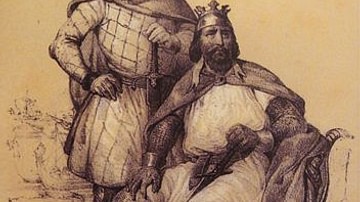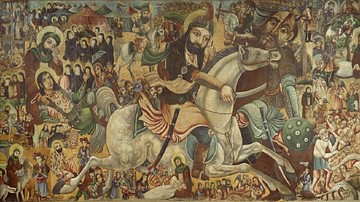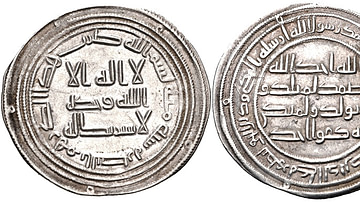Search
Search Results

Definition
Ibn Battuta
Ibn Battuta (l. 1304-1368/69) was a Moroccan explorer from Tangier whose expeditions took him further than any other traveler of his time and resulted in his famous work, The Rihla of Ibn Battuta. Scholar Douglas Bullis notes that “rihla”...

Definition
Roger I of Sicily
Roger I, also known as Roger Bosso (c. 1031-1101) was a Norman knight and adventurer best known for conquering The Emirate of Sicily during the 11th century. His lifelong efforts helped lay the foundations of a wealthy new Mediterranean state...

Video
The Genius of their Age: Ibn Sina, Biruni, and the Lost Enlightenment
A vibrant portrait of an age when Arabic enlightenment anticipated and inspired the European Renaissance, illuminated by its guiding figures and rivals, Ibn Sina and Biruni. In The Genius of their Age, S. Frederick Starr follows up his...

Article
Battle of Karbala
The Battle of Karbala (10 October 680 CE) was a small-scaled military engagement, fought near the river Euphrates, in modern-day Iraq, which saw the massacre of heavily outnumbered Alid troops under the command of Husayn ibn Ali (l. 626-680...

Definition
Ali ibn Abi Talib
Ali ibn Abi Talib, or simply Ali, (l. 601-661 CE) was among the first Muslims, a cousin and son-in-law of the Islamic Prophet Muhammad (l. 570-632 CE), and later reigned as the fourth Caliph of Islam from 656 CE to 661 CE, when he was murdered...

Article
Ibn Sina, Biruni, and the Lost Enlightenment
Ibn Sina and Biruni were two of the most outstanding thinkers to have lived between ancient Greece and the European Renaissance. These two giants of a lost era of enlightenment were born in Central Asia about the year 980. For six hundred...

Definition
Umayyad Dynasty
The Umayyad Dynasty (661-750 CE), the first dynasty to take the title of Caliphate, was established in 661 CE by Muawiya (l. c. 602-680 CE), who had served as the governor of Syria under the Rashidun Caliphate, after the death of the fourth...

Definition
Uthman
Uthman ibn Affan (l. 576/583-656 CE) was an early convert to Islam, a close friend and son-in-law of Prophet Muhammad (l. 570-632 CE), and the third caliph (r. 644-656 CE) of the Rashidun Caliphate (632-661 CE). His charitable acts and modesty...

Definition
Islamic Caliphates
Caliphate (“Khilafat” in Arabic) was a semi-religious political system of governance in Islam, in which the territories of the Islamic empire in the Middle East and North Africa and the people within were ruled by a supreme leader called...

Definition
Abu Bakr
Abu Bakr (l. 573-634 CE, r. 632-634 CE) was an early convert of Islam; he was a close friend and confidant of the Islamic Prophet Muhammad, and became the first caliph of the Islamic empire – a successor to Muhammad's temporal position but...